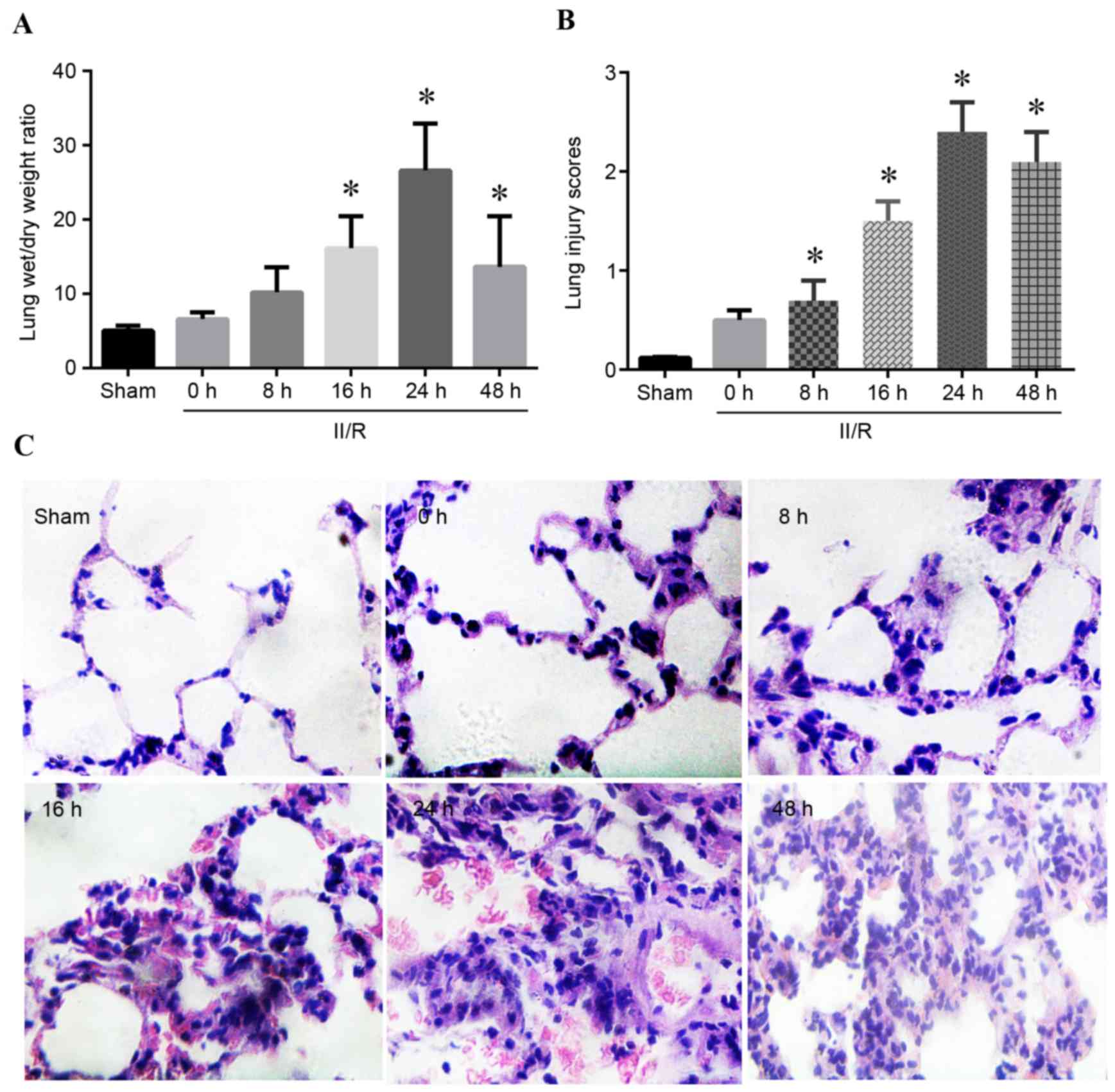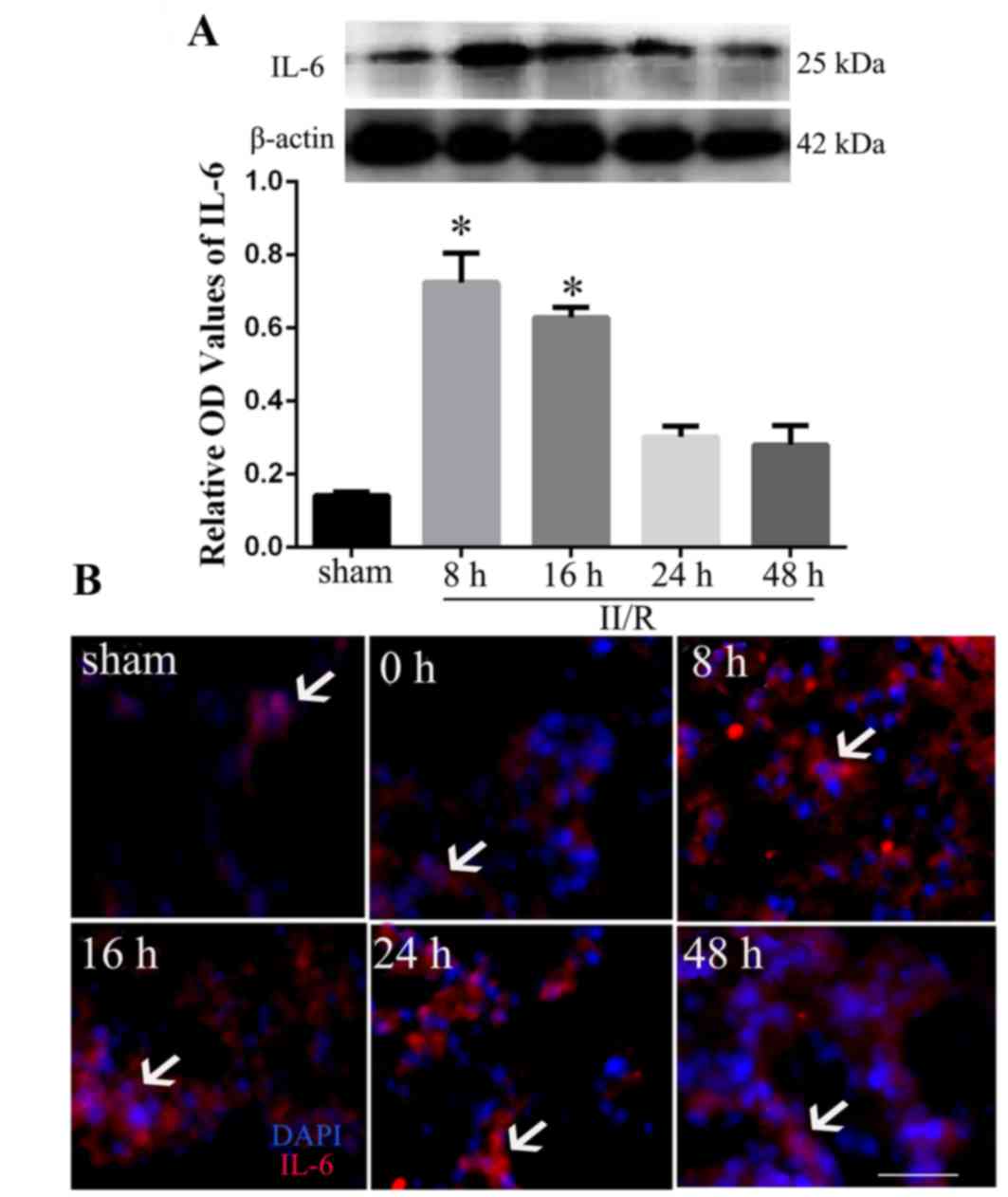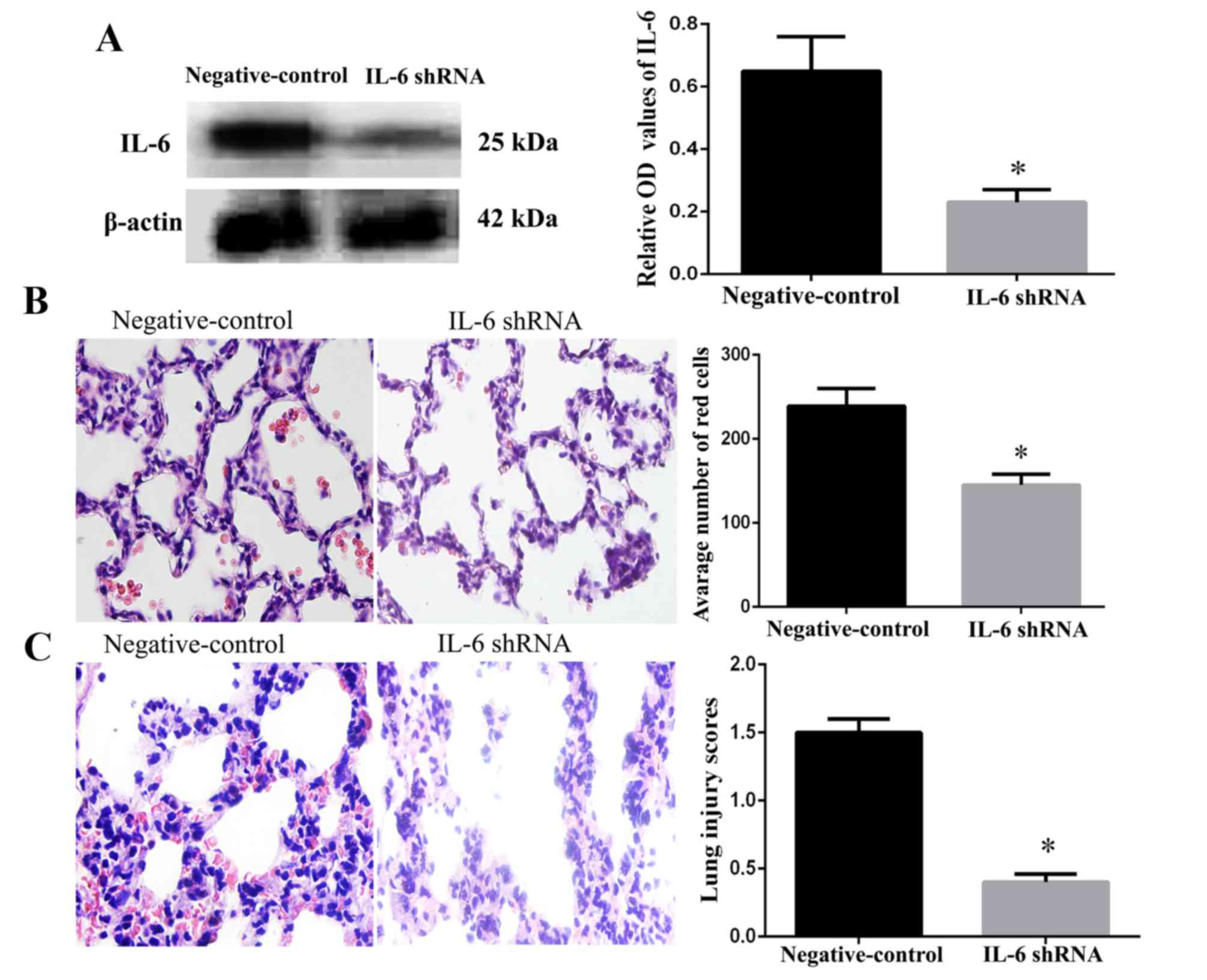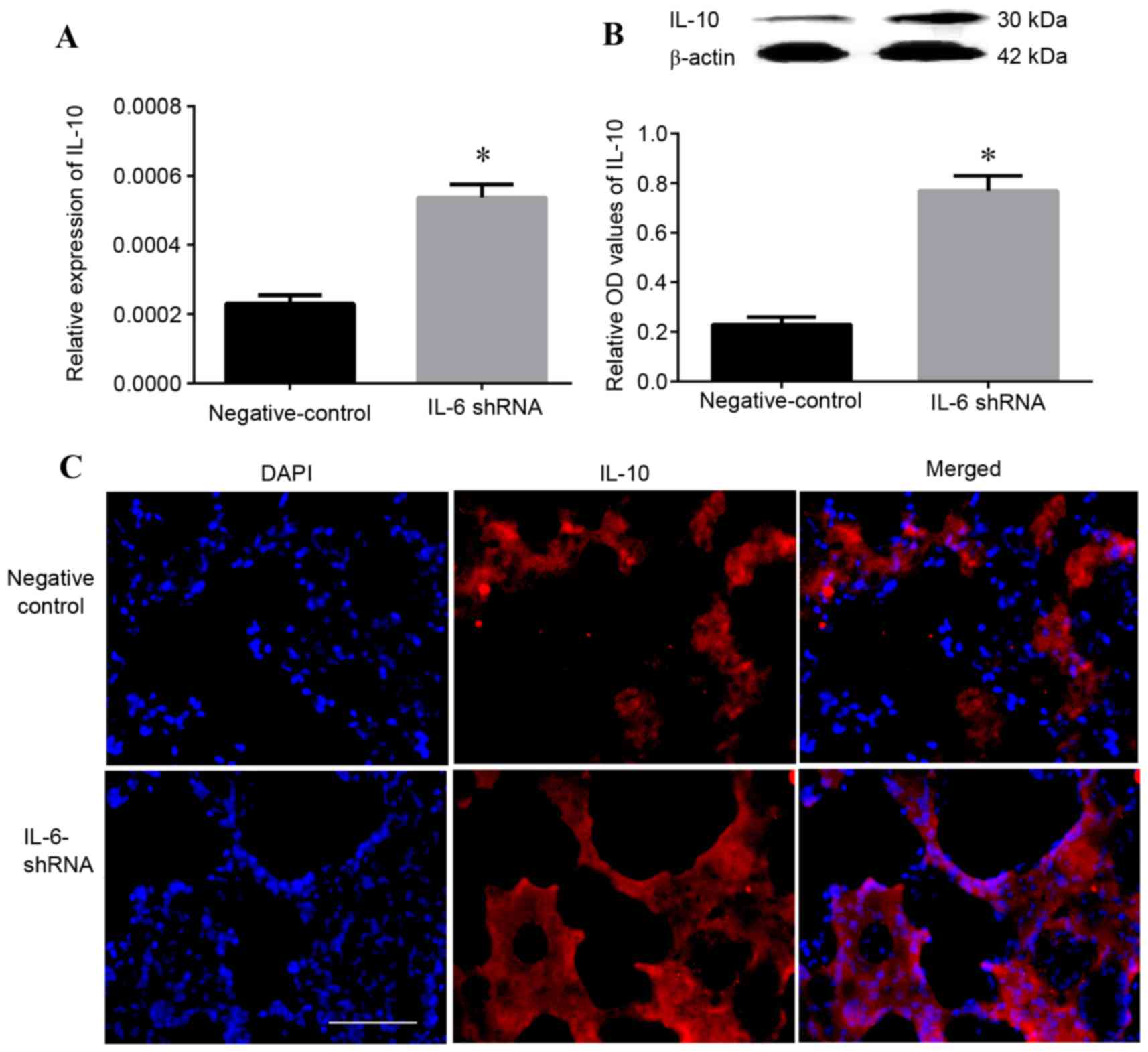|
1
|
Tadros T, Traber DL, Heggers JP and
Herndon DN: Effects of interleukin-1alpha administration on
intestinal ischemia and reperfusion injury, mucosal permeability
and bacterial translocation in burn and sepsis. Ann Surg.
237:101–109. 2003. View Article : Google Scholar : PubMed/NCBI
|
|
2
|
Kumar S, Boehm J and Lee JC: p38 MAP
kinases: Key signalling molecules as therapeutic targets for
inflammatory diseases. Nat Rev Drug Discov. 2:717–726. 2003.
View Article : Google Scholar : PubMed/NCBI
|
|
3
|
Tendler DA: Acute intestinal ischemia and
infarction. Semin Gastrointest Dis. 14:66–76. 2003.PubMed/NCBI
|
|
4
|
Kim K, Li YQ, Jin G, Chong W, Liu BL, Lu
J, Lee K, Demoya M, Velmahos G and Alam HB: Effect of valproicacid
on acute lung injury in a rodent model of intestinal ischemia
reperfusion. Resuscitation. 83:243–248. 2012. View Article : Google Scholar : PubMed/NCBI
|
|
5
|
Harward TR, Brooks DL, Flynn TC and Seeger
JM: Multiple organ dysfunction after mesenteric artery
revascularization. J Vasc Surg. 18:459–469. 1993. View Article : Google Scholar : PubMed/NCBI
|
|
6
|
Cui T, Miksa M, Wu R, Komura H, Zhou M,
Dong W, Wang Z, Higuchi S, Chaung W, Blau SA, et al: Milk fat
globule epidermal growth factor 8 attenuates acute lung injury in
mice after intestinal ischemia and reperfusion. Am J Respir Crit
Care Med. 181:238–246. 2010. View Article : Google Scholar : PubMed/NCBI
|
|
7
|
Narita K, Kuwabara Y and Fujii Y: Lung
injury after intestinal ischemia-reperfusion may be avoided by the
reduced absorption of locally produced cytokines. Surg Today.
34:937–942. 2004. View Article : Google Scholar : PubMed/NCBI
|
|
8
|
Sayan H, Ozacmak VH, Sen F, Cabuk M, Atik
DY, Igdem AA and Ozacmak ID: Pharmacological preconditioning with
erythropoietin reduces ischemia-reperfusion injury in the small
intestine of rats. Life Sci. 84:364–371. 2009. View Article : Google Scholar : PubMed/NCBI
|
|
9
|
Sukhotnik I, Slijper N, Pollak Y,
Chemodanov E, Shaoul R, Coran AG and Mogilner JG: Parenteral
omega-3 fatty acids (Omegaven) modulate intestinal recovery after
intestinal ischemia-reperfusion in a rat model. J Pediatr Surg.
46:1353–1360. 2011. View Article : Google Scholar : PubMed/NCBI
|
|
10
|
Grommes J and Soehnlein O: Contribution of
neutrophils to acute lung injury. Mol Med. 17:293–307. 2011.
View Article : Google Scholar : PubMed/NCBI
|
|
11
|
Damas P, Ledoux D, Nys M, Vrindts Y, De
Groote D, Franchimont P and Lamy M: Cytokine serum level during
severe sepsis in human IL-6 as a marker of severity. Ann Surg.
215:356–362. 1992. View Article : Google Scholar : PubMed/NCBI
|
|
12
|
Farmer DG, McDiarmid SV, Kuniyoshi J,
Robert ME, Shaked A and Busuttil RW: Intragraft expression of
messenger RNA for interleukin-6 and tumor necrosis factoralpha is a
predictor of rat small intestine transplant rejection. J Surg Res.
57:138–142. 1994. View Article : Google Scholar : PubMed/NCBI
|
|
13
|
McDiarmid SV, Farmer DG, Kuniyoshi JS,
Robert M, Khadavi A, Shaked A and Busuttil RW: The correlation of
intragraft cytokine expression with rejection in rat small
intestine transplantation. Transplantation. 58:690–697. 1994.
View Article : Google Scholar : PubMed/NCBI
|
|
14
|
Tanaka T, Narazaki M and Kishimoto T: IL-6
in inflammation, immunity, and disease. Cold Spring Harb Perspect
Biol. 6:a0162952014. View Article : Google Scholar : PubMed/NCBI
|
|
15
|
Molmenti EP, Ziambaras T and Perlmutter
DH: Evidence for an acute phase response in human intestinal
epithelial cells. J Biol Chem. 268:14116–14124. 1993.PubMed/NCBI
|
|
16
|
Beagley KW, Eldridge JH, Lee F, Kiyono H,
Everson MP, Koopman WJ, Hirano T, Kishimoto T and McGhee JR:
Interleukins and IgA synthesis. Human and murine interleukin 6
induce high rate IgA secretion in IgA-committed B cells. J Exp Med.
169:2133–2148. 1989. View Article : Google Scholar : PubMed/NCBI
|
|
17
|
Kimizuka K, Nakao A, Nalesnik MA, Demetris
AJ, Uchiyama T, Ruppert K, Fink MP, Stolz DB and Murase N:
Exogenous IL-6 inhibits acute inflammatory responses and prevents
ischemia/reperfusion injury after intestinal transplantation. Am J
Transplant. 4:482–494. 2004. View Article : Google Scholar : PubMed/NCBI
|
|
18
|
Shen J and Fu G, Jiang L, Xu J, Li L and
Fu G: Effect of dexmedetomidine pretreatment on lung injury
following intestinal ischemia-reperfusion. Exp Ther Med.
6:1359–1364. 2013.PubMed/NCBI
|
|
19
|
He DK, Shao YR, Zhang L, Shen J, Zhong ZY,
Wang J and Xu G: Adenovirus-delivered angiopoietin-1 suppresses
NF-κB and p38 MAPK and attenuates inflammatory responses in
phosgene-induced acute lung injury. Inhal Toxicol. 26:185–192.
2014. View Article : Google Scholar : PubMed/NCBI
|
|
20
|
O'Dea KP, Dokpesi JO, Tatham KC, Wilson MR
and Takata M: Regulation of monocyte subset proinflammatory
responses within the lung microvasculature by the p38 MAPK/MK2
pathway. Am J Physiol Lung Cell Mol Physiol. 301:L812–L821. 2011.
View Article : Google Scholar : PubMed/NCBI
|
|
21
|
Al-Sadi R, Ye D, Boivin M, Guo S, Hashimi
M, Ereifej L and Ma TY: Interleukin-6 modulation of intestinal
epithelial tight junction permeability is mediated by JNK pathway
activation of claudin-2 gene. PLoS One. 9:e853452014. View Article : Google Scholar : PubMed/NCBI
|
|
22
|
Ulich TR, Yin S, Guo K, Yi ES, Remick D
and del Castillo J: Intratracheal injection of endotoxin and
cytokines. II. Interleukin-6 and transforming growth factor beta
inhibit acute inflammation. Am J Pathol. 138:1097–1101.
1991.PubMed/NCBI
|
|
23
|
Camargo CA Jr, Madden JF, Gao W, Selvan RS
and Clavien PA: Interleukin-6 protects liver against warm
ischemia/reperfusion injury and promotes hepatocyte proliferation
in the rodent. Hepatology. 26:1513–1520. 1997. View Article : Google Scholar : PubMed/NCBI
|
|
24
|
Wei D, Huang ZH, Zhang RH, Wang CL, Xu MJ,
Liu BJ, Wang GH and Xu T: Roles of p38 MAPK in the regulation of
the inflammatory response to swine influenza virus-induced acute
lung injury in mice. Acta Virol. 58:374–379. 2014. View Article : Google Scholar : PubMed/NCBI
|
|
25
|
Guido BC, Zanatelli M, Tavares-de-Lima W,
Oliani SM and Damazo AS: Annexin-A1 peptide down-regulates the
leukocyte recruitment and up-regulates interleukin-10 release into
lung after intestinal ischemia-reperfusion in mice. J Inflamm
(Lond). 10:102013. View Article : Google Scholar : PubMed/NCBI
|
|
26
|
Gloor B, Todd KE, Lane JS, Rigberg DA and
Reber HA: Mechanism of increased lung injury after acute
pancreatitis in IL-10 knockout mice. J Surg Res. 80:110–114. 1998.
View Article : Google Scholar : PubMed/NCBI
|
|
27
|
Napoli C, Lemieux C and Jorgensen R:
Introduction of a chimeric chalcone synthase gene into petunia
results in reversible co-suppression of homologous genes in trans.
Plant Cell. 2:279–289. 1990. View
Article : Google Scholar : PubMed/NCBI
|
|
28
|
Younis A, Siddique MI, Kim CK and Lim KB:
RNA interference (RNAi) induced gene silencing: A promising
approach of hi-tech plant breeding. Int J Biol Sci. 10:1150–1158.
2014. View Article : Google Scholar : PubMed/NCBI
|
|
29
|
Bosher JM and Labouesse M: RNA
interference: Genetic wand and genetic watchdog. Nat Cell Biol.
2:E31–E36. 2000. View
Article : Google Scholar : PubMed/NCBI
|
|
30
|
Kim DH and Rossi JJ: Strategies for
silencing human disease using RNA interference. Nat Rev Genet.
8:173–184. 2007. View
Article : Google Scholar : PubMed/NCBI
|
|
31
|
Liu R, Zhao W, Zhao Q, Liu SJ, Liu J, He
M, Xu Y, Wang W, Liu W, Xia QJ, et al: Endoplasmic reticulum
protein 29 protects cortical neurons from apoptosis and promoting
corticospinal tract regeneration to improve neural behavior via
caspase and Erk signal in rats with spinal cord transection. Mol
Neurobiol. 50:1035–1048. 2014. View Article : Google Scholar : PubMed/NCBI
|
|
32
|
Crisafulli C, Mazzon E, Galuppo M,
Paterniti I, Caminiti R and Cuzzocrea S: Olprinone attenuates the
development of ischemia/reperfusion injury of the gut. Intensive
Care Med. 36:1235–1247. 2010. View Article : Google Scholar : PubMed/NCBI
|
|
33
|
Kim K, Li Y, Jin G, Chong W, Liu B, Lee K,
Demoya M, Velmahos GC and Alam HB: Effect of valproic acid on acute
lung injury in a rodent model of intestinal ischemia reperfusion.
Resuscitation. 83:243–248. 2012. View Article : Google Scholar : PubMed/NCBI
|
|
34
|
Pei YH, Cai XM, Chen J, Sun BD, Sun ZR,
Wang X and Qian XM: The role of p38 MAPK in acute paraquat-induced
lung injury in rats. Inhal Toxicol. 26:880–884. 2014. View Article : Google Scholar : PubMed/NCBI
|
|
35
|
Livak KJ and Schmittgen TD: Analysis of
relative gene expression data using real-time quantitative PCR and
the 2(−Delta Delta C (T)) method. Methods. 25:402–408. 2001.
View Article : Google Scholar : PubMed/NCBI
|
|
36
|
Zheng DY, Zhou M, Jin J, He M, Wang Y, Du
J, Xiao XY, Li PY, Ye AZ, Liu J and Wang TH: Inhibition of P38 MAPK
downregulates the expression of IL-1β to protect lung from acute
injury in intestinal ischemia reperfusion rats. Mediators Inflamm.
2016:93480372016. View Article : Google Scholar : PubMed/NCBI
|
|
37
|
Jiang L, Tan Y, Tian J, Ma HY, Li JT and
Luo CZ: Morphological character of lung injury and its functional
implication in adult rats subjected to brain ischemia. Ibrain.
1:1–8. 2015.
|
|
38
|
Zhou M and Wang TH: Temporal and spatial
pattern of lung injury in rats subjected to intestinal ischemia
reperfusion. Idiscovery. 1:1–8. 2015.
|
|
39
|
Zarubin T and Han J: Activation and
signaling of the p38 MAP kinase pathway. Cell Res. 15:11–18. 2005.
View Article : Google Scholar : PubMed/NCBI
|
|
40
|
Ben DF, Yu XY, Ji GY, Zheng DY, Lv KY, Ma
B and Xia ZF: TLR4 mediates lung injury and inflammation in
intestinal ischemia-reperfusion. J Surg Res. 174:326–333. 2012.
View Article : Google Scholar : PubMed/NCBI
|
|
41
|
Hirano T, Akira S, Taga T and Kishimoto T:
Biological and clinical aspects of interleukin 6. Immunol Today.
11:443–449. 1990. View Article : Google Scholar : PubMed/NCBI
|
|
42
|
Akira S, Taga T and Kishimoto T:
Interleukin-6 in biology and medicine. Adv Immunol. 54:1–78. 1993.
View Article : Google Scholar : PubMed/NCBI
|
|
43
|
Riffo-Vasquez Y and Spina D: Role of
cytokines and chemokines in bronchial hyperresponsiveness and
airway inflammation. Pharmacol Ther. 94:185–211. 2002. View Article : Google Scholar : PubMed/NCBI
|
|
44
|
Zhao W, Gan X, Su G, Wanling G, Li S, Hei
Z, Yang C and Wang H: The interaction between oxidative stress and
mast cell activation plays a role in acute lung injuries induced by
intestinal ischemia-reperfusion. J Surg Res. 187:542–552. 2014.
View Article : Google Scholar : PubMed/NCBI
|
|
45
|
Mo LQ, Chen Y, Song L, Wu GM, Tang N,
Zhang YY, Wang XB, Liu KX and Zhou J: Osthole prevents intestinal
ischemia-reperfusion-induced lung injury in a rodent model. J Surg
Res. 189:285–294. 2014. View Article : Google Scholar : PubMed/NCBI
|
|
46
|
Zabot GP, Carvalhal GF, Marroni NP,
Hartmann RM, da Silva VD and Fillmann HS: Glutamine prevents
oxidative stress in a model of mesenteric ischemia and reperfusion.
World J Gastroenterol. 20:11406–11414. 2014. View Article : Google Scholar : PubMed/NCBI
|
|
47
|
Matsuo S, Yang WL, Aziz M, Jacob A and
Wang P: Cyclic arginine-glycine-aspartate attenuates acute lung
injury in mice after intestinal ischemia/reperfusion. Crit Care.
17:R192013. View Article : Google Scholar : PubMed/NCBI
|
|
48
|
Wang GZ, Yao JH, Jing HR, Zhang F, Lin MS,
Shi L, Wu H, Gao DY, Liu KX and Tian XF: Suppression of the p66shc
adapter protein by protocatechuic acid prevents the development of
lung injury induced by intestinal ischemia reperfusion in mice. J
Trauma Acute Care Surg. 73:1130–1137. 2012. View Article : Google Scholar : PubMed/NCBI
|
|
49
|
Goodman RB, Pugin J, Lee JS and Matthay
MA: Cytokine-mediated inflammation in acute lung injury. Cytokine
Growth Factor Rev. 14:523–535. 2003. View Article : Google Scholar : PubMed/NCBI
|
|
50
|
Bhatia M and Moochhala S: Role of
inflammatory mediators in the pathophysiology of acute respiratory
distress syndrome. J Pathol. 202:145–156. 2004. View Article : Google Scholar : PubMed/NCBI
|



















